Analysis of Tourism Policy and Planning in British Columbia
VerifiedAdded on 2022/08/01
|7
|2688
|26
Report
AI Summary
This report examines tourism policy and planning in British Columbia, prompted by the Tourism Industry Association of British Columbia (TIABC) addressing the lack of affordable accommodation for tourism workers. It analyzes the policy instrument suggested by TIABC to eliminate Municipal and Regional District Tax (MRDT) and Provincial Sales Tax (PST) exemptions for small property owners offering short-term rentals (STRs). The report contrasts the effectiveness of municipal versus provincial-level policies, considering the implications of each approach. Furthermore, it proposes and justifies two alternative policies: reducing taxes for traditional accommodation providers and encouraging the creation of more STRs to increase affordable options. The analysis considers the seasonal nature of the tourism industry and the need for flexible, cost-effective accommodation solutions for temporary workers. The report concludes by emphasizing the importance of tailored policies to address the specific needs of different communities and the broader provincial tourism landscape.
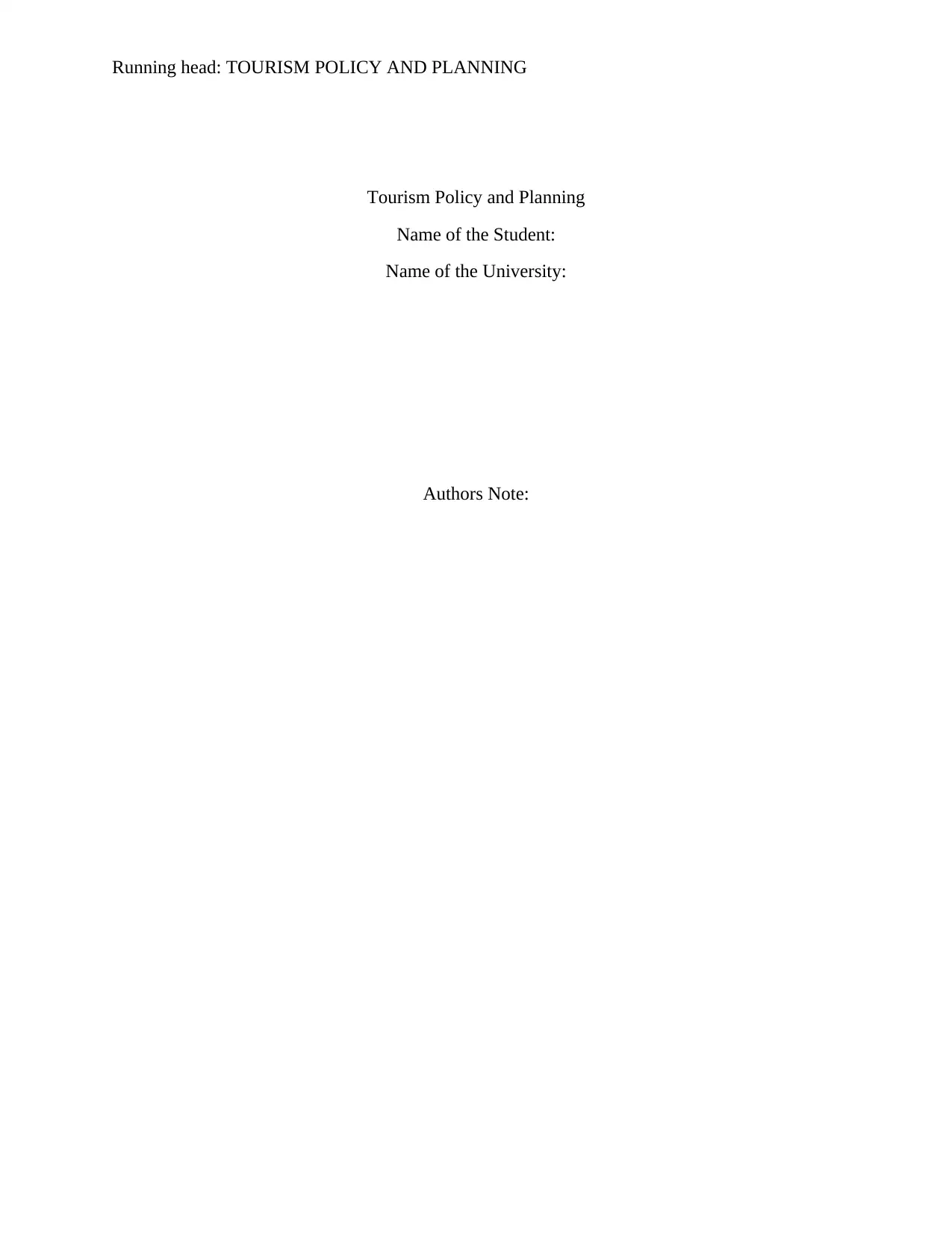
Running head: TOURISM POLICY AND PLANNING
Tourism Policy and Planning
Name of the Student:
Name of the University:
Authors Note:
Tourism Policy and Planning
Name of the Student:
Name of the University:
Authors Note:
Paraphrase This Document
Need a fresh take? Get an instant paraphrase of this document with our AI Paraphraser
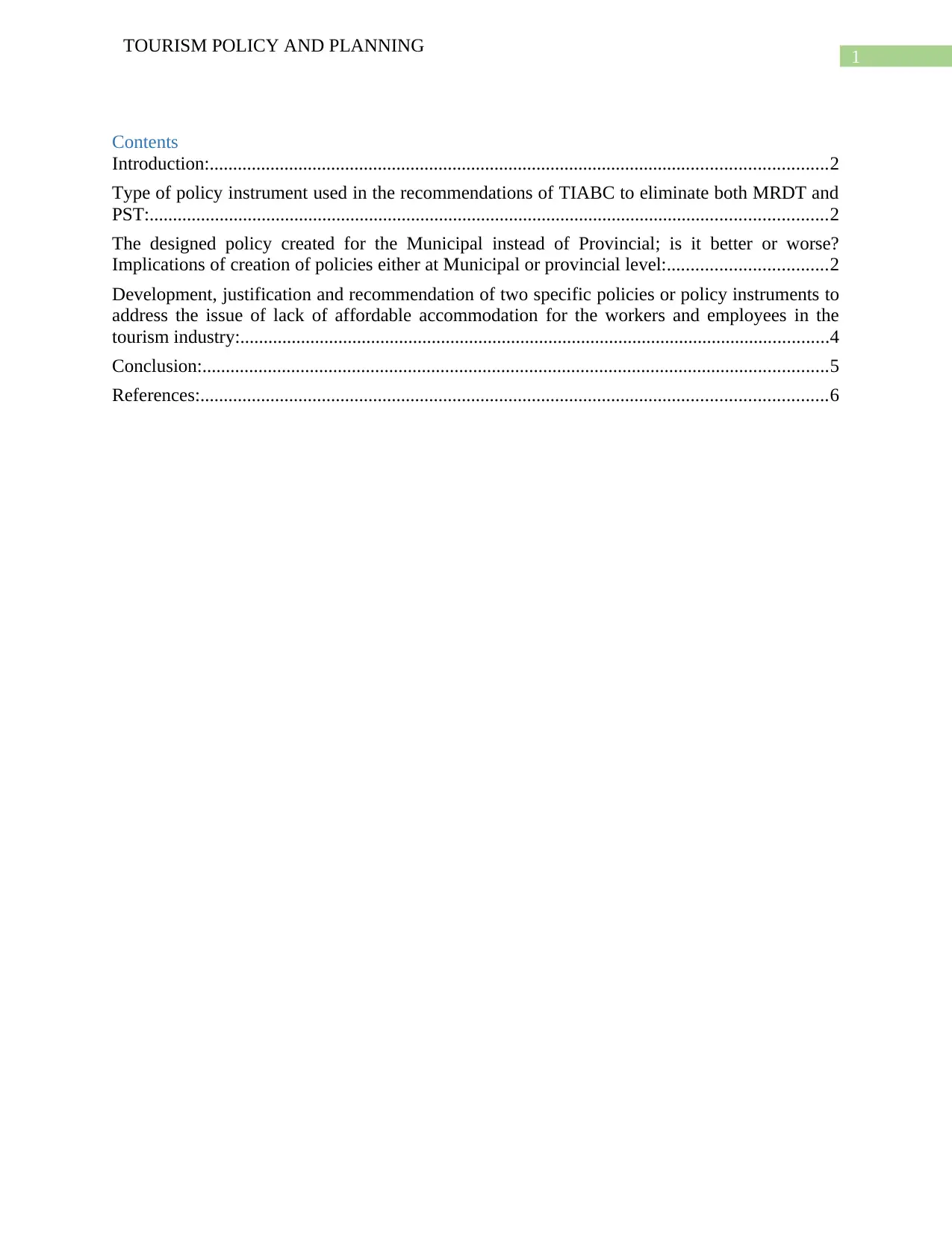
1
TOURISM POLICY AND PLANNING
Contents
Introduction:....................................................................................................................................2
Type of policy instrument used in the recommendations of TIABC to eliminate both MRDT and
PST:.................................................................................................................................................2
The designed policy created for the Municipal instead of Provincial; is it better or worse?
Implications of creation of policies either at Municipal or provincial level:..................................2
Development, justification and recommendation of two specific policies or policy instruments to
address the issue of lack of affordable accommodation for the workers and employees in the
tourism industry:..............................................................................................................................4
Conclusion:......................................................................................................................................5
References:......................................................................................................................................6
TOURISM POLICY AND PLANNING
Contents
Introduction:....................................................................................................................................2
Type of policy instrument used in the recommendations of TIABC to eliminate both MRDT and
PST:.................................................................................................................................................2
The designed policy created for the Municipal instead of Provincial; is it better or worse?
Implications of creation of policies either at Municipal or provincial level:..................................2
Development, justification and recommendation of two specific policies or policy instruments to
address the issue of lack of affordable accommodation for the workers and employees in the
tourism industry:..............................................................................................................................4
Conclusion:......................................................................................................................................5
References:......................................................................................................................................6
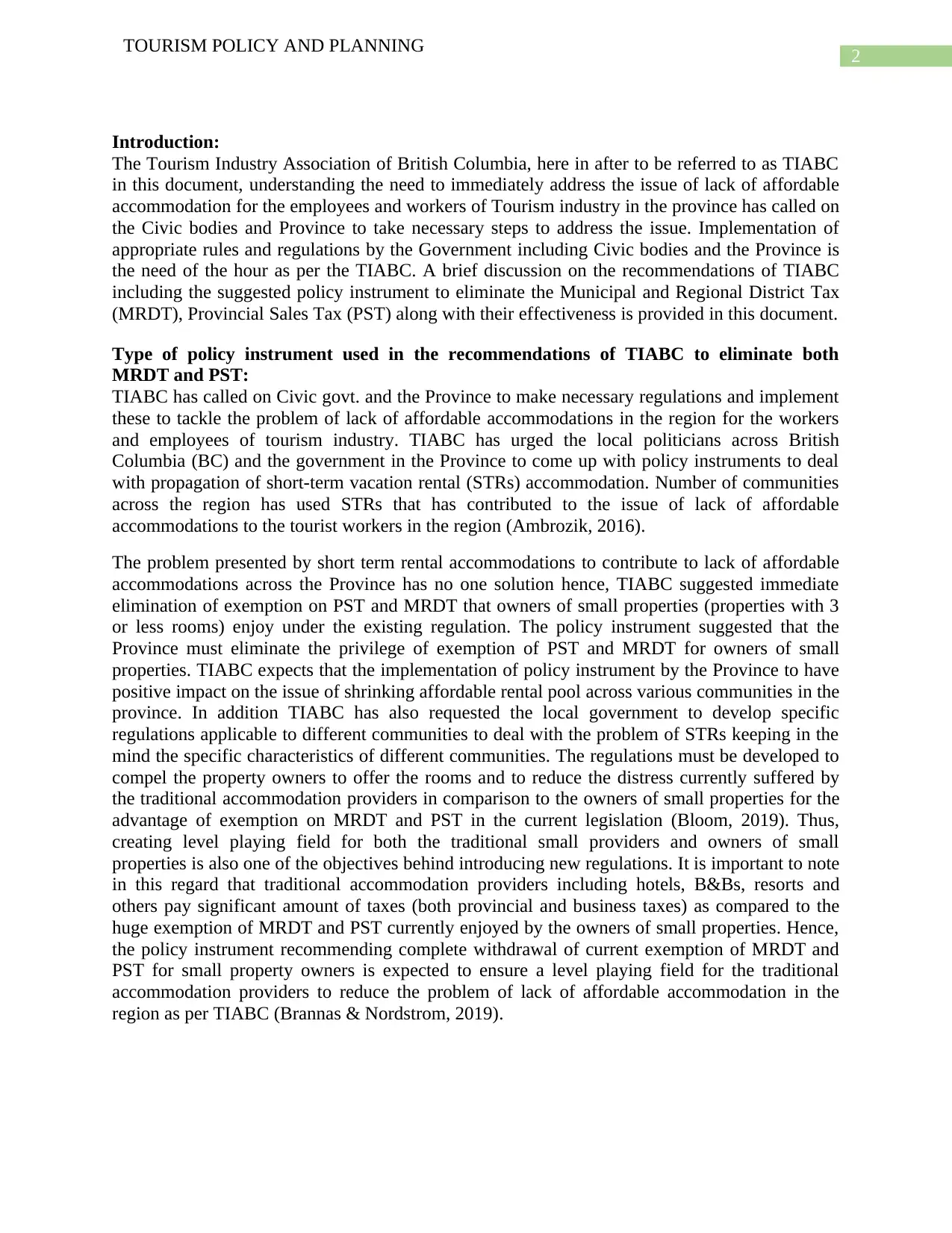
2
TOURISM POLICY AND PLANNING
Introduction:
The Tourism Industry Association of British Columbia, here in after to be referred to as TIABC
in this document, understanding the need to immediately address the issue of lack of affordable
accommodation for the employees and workers of Tourism industry in the province has called on
the Civic bodies and Province to take necessary steps to address the issue. Implementation of
appropriate rules and regulations by the Government including Civic bodies and the Province is
the need of the hour as per the TIABC. A brief discussion on the recommendations of TIABC
including the suggested policy instrument to eliminate the Municipal and Regional District Tax
(MRDT), Provincial Sales Tax (PST) along with their effectiveness is provided in this document.
Type of policy instrument used in the recommendations of TIABC to eliminate both
MRDT and PST:
TIABC has called on Civic govt. and the Province to make necessary regulations and implement
these to tackle the problem of lack of affordable accommodations in the region for the workers
and employees of tourism industry. TIABC has urged the local politicians across British
Columbia (BC) and the government in the Province to come up with policy instruments to deal
with propagation of short-term vacation rental (STRs) accommodation. Number of communities
across the region has used STRs that has contributed to the issue of lack of affordable
accommodations to the tourist workers in the region (Ambrozik, 2016).
The problem presented by short term rental accommodations to contribute to lack of affordable
accommodations across the Province has no one solution hence, TIABC suggested immediate
elimination of exemption on PST and MRDT that owners of small properties (properties with 3
or less rooms) enjoy under the existing regulation. The policy instrument suggested that the
Province must eliminate the privilege of exemption of PST and MRDT for owners of small
properties. TIABC expects that the implementation of policy instrument by the Province to have
positive impact on the issue of shrinking affordable rental pool across various communities in the
province. In addition TIABC has also requested the local government to develop specific
regulations applicable to different communities to deal with the problem of STRs keeping in the
mind the specific characteristics of different communities. The regulations must be developed to
compel the property owners to offer the rooms and to reduce the distress currently suffered by
the traditional accommodation providers in comparison to the owners of small properties for the
advantage of exemption on MRDT and PST in the current legislation (Bloom, 2019). Thus,
creating level playing field for both the traditional small providers and owners of small
properties is also one of the objectives behind introducing new regulations. It is important to note
in this regard that traditional accommodation providers including hotels, B&Bs, resorts and
others pay significant amount of taxes (both provincial and business taxes) as compared to the
huge exemption of MRDT and PST currently enjoyed by the owners of small properties. Hence,
the policy instrument recommending complete withdrawal of current exemption of MRDT and
PST for small property owners is expected to ensure a level playing field for the traditional
accommodation providers to reduce the problem of lack of affordable accommodation in the
region as per TIABC (Brannas & Nordstrom, 2019).
TOURISM POLICY AND PLANNING
Introduction:
The Tourism Industry Association of British Columbia, here in after to be referred to as TIABC
in this document, understanding the need to immediately address the issue of lack of affordable
accommodation for the employees and workers of Tourism industry in the province has called on
the Civic bodies and Province to take necessary steps to address the issue. Implementation of
appropriate rules and regulations by the Government including Civic bodies and the Province is
the need of the hour as per the TIABC. A brief discussion on the recommendations of TIABC
including the suggested policy instrument to eliminate the Municipal and Regional District Tax
(MRDT), Provincial Sales Tax (PST) along with their effectiveness is provided in this document.
Type of policy instrument used in the recommendations of TIABC to eliminate both
MRDT and PST:
TIABC has called on Civic govt. and the Province to make necessary regulations and implement
these to tackle the problem of lack of affordable accommodations in the region for the workers
and employees of tourism industry. TIABC has urged the local politicians across British
Columbia (BC) and the government in the Province to come up with policy instruments to deal
with propagation of short-term vacation rental (STRs) accommodation. Number of communities
across the region has used STRs that has contributed to the issue of lack of affordable
accommodations to the tourist workers in the region (Ambrozik, 2016).
The problem presented by short term rental accommodations to contribute to lack of affordable
accommodations across the Province has no one solution hence, TIABC suggested immediate
elimination of exemption on PST and MRDT that owners of small properties (properties with 3
or less rooms) enjoy under the existing regulation. The policy instrument suggested that the
Province must eliminate the privilege of exemption of PST and MRDT for owners of small
properties. TIABC expects that the implementation of policy instrument by the Province to have
positive impact on the issue of shrinking affordable rental pool across various communities in the
province. In addition TIABC has also requested the local government to develop specific
regulations applicable to different communities to deal with the problem of STRs keeping in the
mind the specific characteristics of different communities. The regulations must be developed to
compel the property owners to offer the rooms and to reduce the distress currently suffered by
the traditional accommodation providers in comparison to the owners of small properties for the
advantage of exemption on MRDT and PST in the current legislation (Bloom, 2019). Thus,
creating level playing field for both the traditional small providers and owners of small
properties is also one of the objectives behind introducing new regulations. It is important to note
in this regard that traditional accommodation providers including hotels, B&Bs, resorts and
others pay significant amount of taxes (both provincial and business taxes) as compared to the
huge exemption of MRDT and PST currently enjoyed by the owners of small properties. Hence,
the policy instrument recommending complete withdrawal of current exemption of MRDT and
PST for small property owners is expected to ensure a level playing field for the traditional
accommodation providers to reduce the problem of lack of affordable accommodation in the
region as per TIABC (Brannas & Nordstrom, 2019).
⊘ This is a preview!⊘
Do you want full access?
Subscribe today to unlock all pages.

Trusted by 1+ million students worldwide
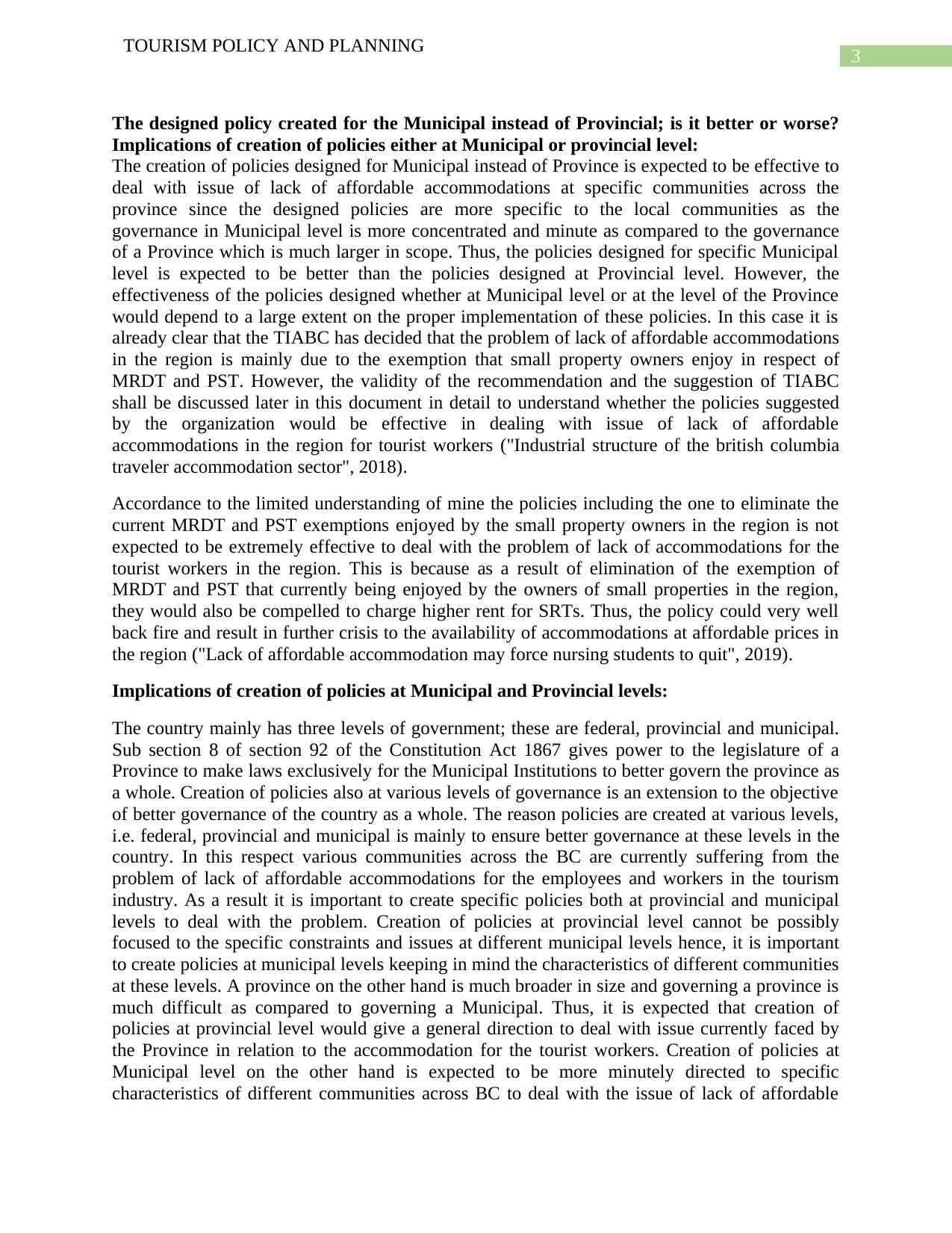
3
TOURISM POLICY AND PLANNING
The designed policy created for the Municipal instead of Provincial; is it better or worse?
Implications of creation of policies either at Municipal or provincial level:
The creation of policies designed for Municipal instead of Province is expected to be effective to
deal with issue of lack of affordable accommodations at specific communities across the
province since the designed policies are more specific to the local communities as the
governance in Municipal level is more concentrated and minute as compared to the governance
of a Province which is much larger in scope. Thus, the policies designed for specific Municipal
level is expected to be better than the policies designed at Provincial level. However, the
effectiveness of the policies designed whether at Municipal level or at the level of the Province
would depend to a large extent on the proper implementation of these policies. In this case it is
already clear that the TIABC has decided that the problem of lack of affordable accommodations
in the region is mainly due to the exemption that small property owners enjoy in respect of
MRDT and PST. However, the validity of the recommendation and the suggestion of TIABC
shall be discussed later in this document in detail to understand whether the policies suggested
by the organization would be effective in dealing with issue of lack of affordable
accommodations in the region for tourist workers ("Industrial structure of the british columbia
traveler accommodation sector", 2018).
Accordance to the limited understanding of mine the policies including the one to eliminate the
current MRDT and PST exemptions enjoyed by the small property owners in the region is not
expected to be extremely effective to deal with the problem of lack of accommodations for the
tourist workers in the region. This is because as a result of elimination of the exemption of
MRDT and PST that currently being enjoyed by the owners of small properties in the region,
they would also be compelled to charge higher rent for SRTs. Thus, the policy could very well
back fire and result in further crisis to the availability of accommodations at affordable prices in
the region ("Lack of affordable accommodation may force nursing students to quit", 2019).
Implications of creation of policies at Municipal and Provincial levels:
The country mainly has three levels of government; these are federal, provincial and municipal.
Sub section 8 of section 92 of the Constitution Act 1867 gives power to the legislature of a
Province to make laws exclusively for the Municipal Institutions to better govern the province as
a whole. Creation of policies also at various levels of governance is an extension to the objective
of better governance of the country as a whole. The reason policies are created at various levels,
i.e. federal, provincial and municipal is mainly to ensure better governance at these levels in the
country. In this respect various communities across the BC are currently suffering from the
problem of lack of affordable accommodations for the employees and workers in the tourism
industry. As a result it is important to create specific policies both at provincial and municipal
levels to deal with the problem. Creation of policies at provincial level cannot be possibly
focused to the specific constraints and issues at different municipal levels hence, it is important
to create policies at municipal levels keeping in mind the characteristics of different communities
at these levels. A province on the other hand is much broader in size and governing a province is
much difficult as compared to governing a Municipal. Thus, it is expected that creation of
policies at provincial level would give a general direction to deal with issue currently faced by
the Province in relation to the accommodation for the tourist workers. Creation of policies at
Municipal level on the other hand is expected to be more minutely directed to specific
characteristics of different communities across BC to deal with the issue of lack of affordable
TOURISM POLICY AND PLANNING
The designed policy created for the Municipal instead of Provincial; is it better or worse?
Implications of creation of policies either at Municipal or provincial level:
The creation of policies designed for Municipal instead of Province is expected to be effective to
deal with issue of lack of affordable accommodations at specific communities across the
province since the designed policies are more specific to the local communities as the
governance in Municipal level is more concentrated and minute as compared to the governance
of a Province which is much larger in scope. Thus, the policies designed for specific Municipal
level is expected to be better than the policies designed at Provincial level. However, the
effectiveness of the policies designed whether at Municipal level or at the level of the Province
would depend to a large extent on the proper implementation of these policies. In this case it is
already clear that the TIABC has decided that the problem of lack of affordable accommodations
in the region is mainly due to the exemption that small property owners enjoy in respect of
MRDT and PST. However, the validity of the recommendation and the suggestion of TIABC
shall be discussed later in this document in detail to understand whether the policies suggested
by the organization would be effective in dealing with issue of lack of affordable
accommodations in the region for tourist workers ("Industrial structure of the british columbia
traveler accommodation sector", 2018).
Accordance to the limited understanding of mine the policies including the one to eliminate the
current MRDT and PST exemptions enjoyed by the small property owners in the region is not
expected to be extremely effective to deal with the problem of lack of accommodations for the
tourist workers in the region. This is because as a result of elimination of the exemption of
MRDT and PST that currently being enjoyed by the owners of small properties in the region,
they would also be compelled to charge higher rent for SRTs. Thus, the policy could very well
back fire and result in further crisis to the availability of accommodations at affordable prices in
the region ("Lack of affordable accommodation may force nursing students to quit", 2019).
Implications of creation of policies at Municipal and Provincial levels:
The country mainly has three levels of government; these are federal, provincial and municipal.
Sub section 8 of section 92 of the Constitution Act 1867 gives power to the legislature of a
Province to make laws exclusively for the Municipal Institutions to better govern the province as
a whole. Creation of policies also at various levels of governance is an extension to the objective
of better governance of the country as a whole. The reason policies are created at various levels,
i.e. federal, provincial and municipal is mainly to ensure better governance at these levels in the
country. In this respect various communities across the BC are currently suffering from the
problem of lack of affordable accommodations for the employees and workers in the tourism
industry. As a result it is important to create specific policies both at provincial and municipal
levels to deal with the problem. Creation of policies at provincial level cannot be possibly
focused to the specific constraints and issues at different municipal levels hence, it is important
to create policies at municipal levels keeping in mind the characteristics of different communities
at these levels. A province on the other hand is much broader in size and governing a province is
much difficult as compared to governing a Municipal. Thus, it is expected that creation of
policies at provincial level would give a general direction to deal with issue currently faced by
the Province in relation to the accommodation for the tourist workers. Creation of policies at
Municipal level on the other hand is expected to be more minutely directed to specific
characteristics of different communities across BC to deal with the issue of lack of affordable
Paraphrase This Document
Need a fresh take? Get an instant paraphrase of this document with our AI Paraphraser
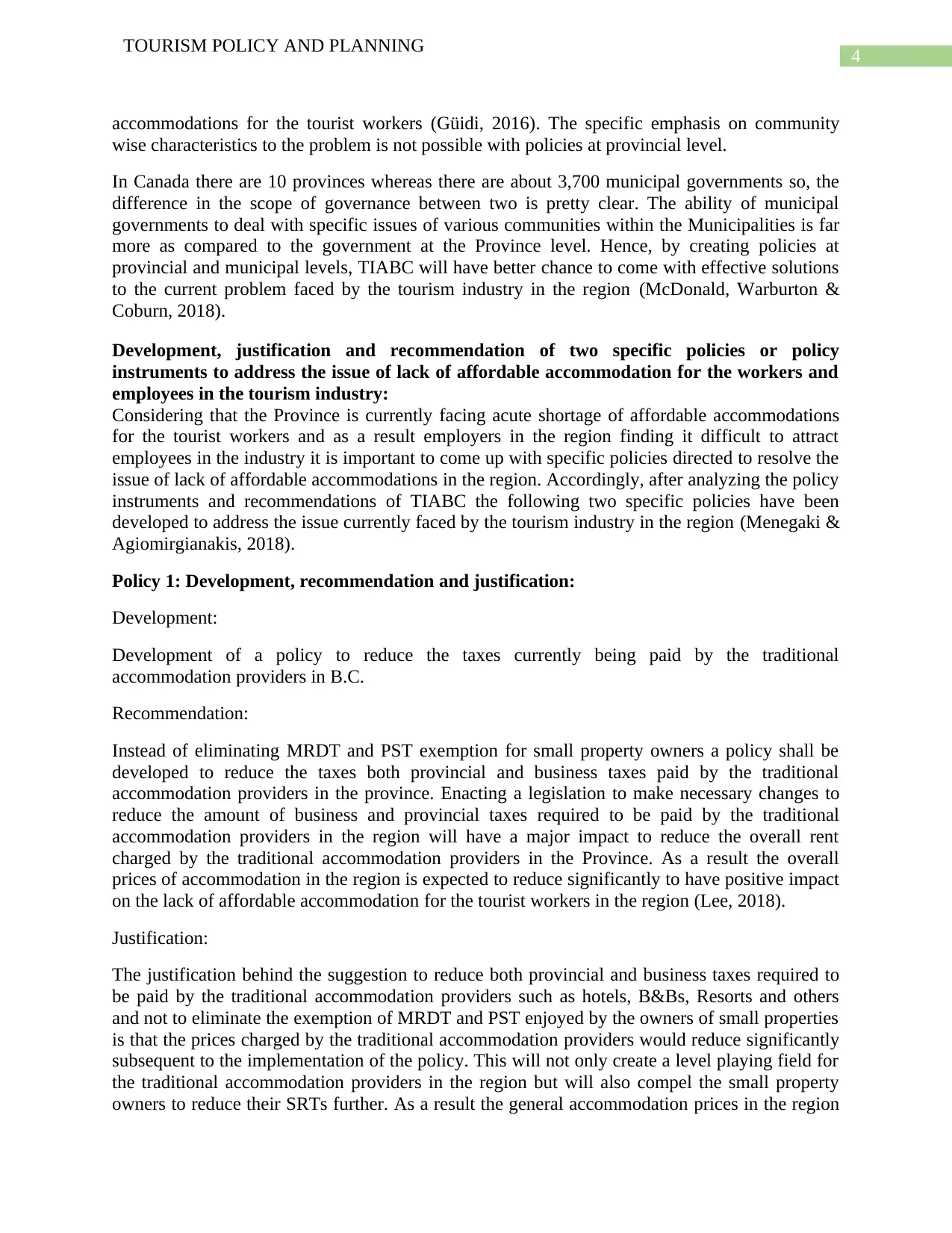
4
TOURISM POLICY AND PLANNING
accommodations for the tourist workers (Güidi, 2016). The specific emphasis on community
wise characteristics to the problem is not possible with policies at provincial level.
In Canada there are 10 provinces whereas there are about 3,700 municipal governments so, the
difference in the scope of governance between two is pretty clear. The ability of municipal
governments to deal with specific issues of various communities within the Municipalities is far
more as compared to the government at the Province level. Hence, by creating policies at
provincial and municipal levels, TIABC will have better chance to come with effective solutions
to the current problem faced by the tourism industry in the region (McDonald, Warburton &
Coburn, 2018).
Development, justification and recommendation of two specific policies or policy
instruments to address the issue of lack of affordable accommodation for the workers and
employees in the tourism industry:
Considering that the Province is currently facing acute shortage of affordable accommodations
for the tourist workers and as a result employers in the region finding it difficult to attract
employees in the industry it is important to come up with specific policies directed to resolve the
issue of lack of affordable accommodations in the region. Accordingly, after analyzing the policy
instruments and recommendations of TIABC the following two specific policies have been
developed to address the issue currently faced by the tourism industry in the region (Menegaki &
Agiomirgianakis, 2018).
Policy 1: Development, recommendation and justification:
Development:
Development of a policy to reduce the taxes currently being paid by the traditional
accommodation providers in B.C.
Recommendation:
Instead of eliminating MRDT and PST exemption for small property owners a policy shall be
developed to reduce the taxes both provincial and business taxes paid by the traditional
accommodation providers in the province. Enacting a legislation to make necessary changes to
reduce the amount of business and provincial taxes required to be paid by the traditional
accommodation providers in the region will have a major impact to reduce the overall rent
charged by the traditional accommodation providers in the Province. As a result the overall
prices of accommodation in the region is expected to reduce significantly to have positive impact
on the lack of affordable accommodation for the tourist workers in the region (Lee, 2018).
Justification:
The justification behind the suggestion to reduce both provincial and business taxes required to
be paid by the traditional accommodation providers such as hotels, B&Bs, Resorts and others
and not to eliminate the exemption of MRDT and PST enjoyed by the owners of small properties
is that the prices charged by the traditional accommodation providers would reduce significantly
subsequent to the implementation of the policy. This will not only create a level playing field for
the traditional accommodation providers in the region but will also compel the small property
owners to reduce their SRTs further. As a result the general accommodation prices in the region
TOURISM POLICY AND PLANNING
accommodations for the tourist workers (Güidi, 2016). The specific emphasis on community
wise characteristics to the problem is not possible with policies at provincial level.
In Canada there are 10 provinces whereas there are about 3,700 municipal governments so, the
difference in the scope of governance between two is pretty clear. The ability of municipal
governments to deal with specific issues of various communities within the Municipalities is far
more as compared to the government at the Province level. Hence, by creating policies at
provincial and municipal levels, TIABC will have better chance to come with effective solutions
to the current problem faced by the tourism industry in the region (McDonald, Warburton &
Coburn, 2018).
Development, justification and recommendation of two specific policies or policy
instruments to address the issue of lack of affordable accommodation for the workers and
employees in the tourism industry:
Considering that the Province is currently facing acute shortage of affordable accommodations
for the tourist workers and as a result employers in the region finding it difficult to attract
employees in the industry it is important to come up with specific policies directed to resolve the
issue of lack of affordable accommodations in the region. Accordingly, after analyzing the policy
instruments and recommendations of TIABC the following two specific policies have been
developed to address the issue currently faced by the tourism industry in the region (Menegaki &
Agiomirgianakis, 2018).
Policy 1: Development, recommendation and justification:
Development:
Development of a policy to reduce the taxes currently being paid by the traditional
accommodation providers in B.C.
Recommendation:
Instead of eliminating MRDT and PST exemption for small property owners a policy shall be
developed to reduce the taxes both provincial and business taxes paid by the traditional
accommodation providers in the province. Enacting a legislation to make necessary changes to
reduce the amount of business and provincial taxes required to be paid by the traditional
accommodation providers in the region will have a major impact to reduce the overall rent
charged by the traditional accommodation providers in the Province. As a result the overall
prices of accommodation in the region is expected to reduce significantly to have positive impact
on the lack of affordable accommodation for the tourist workers in the region (Lee, 2018).
Justification:
The justification behind the suggestion to reduce both provincial and business taxes required to
be paid by the traditional accommodation providers such as hotels, B&Bs, Resorts and others
and not to eliminate the exemption of MRDT and PST enjoyed by the owners of small properties
is that the prices charged by the traditional accommodation providers would reduce significantly
subsequent to the implementation of the policy. This will not only create a level playing field for
the traditional accommodation providers in the region but will also compel the small property
owners to reduce their SRTs further. As a result the general accommodation prices in the region
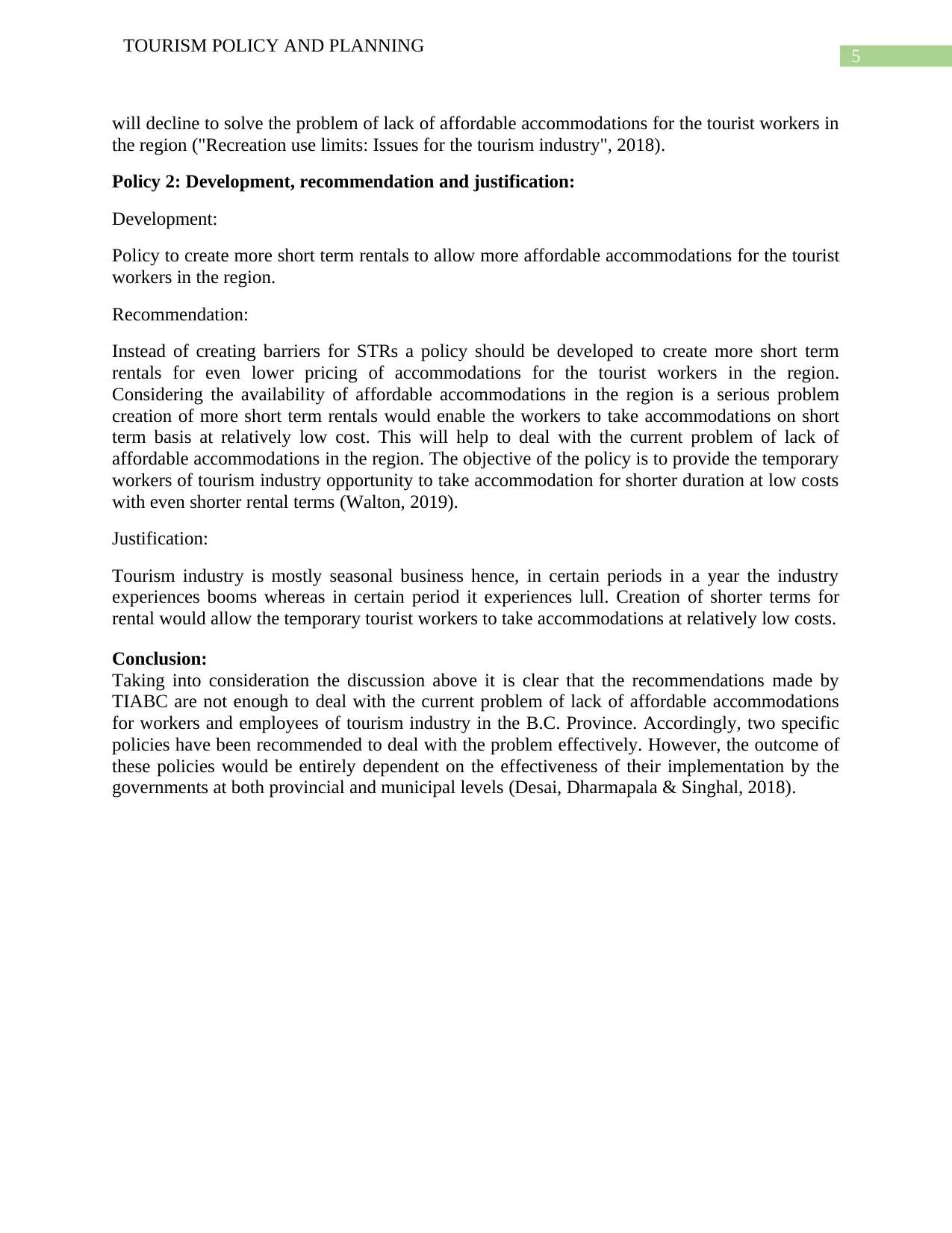
5
TOURISM POLICY AND PLANNING
will decline to solve the problem of lack of affordable accommodations for the tourist workers in
the region ("Recreation use limits: Issues for the tourism industry", 2018).
Policy 2: Development, recommendation and justification:
Development:
Policy to create more short term rentals to allow more affordable accommodations for the tourist
workers in the region.
Recommendation:
Instead of creating barriers for STRs a policy should be developed to create more short term
rentals for even lower pricing of accommodations for the tourist workers in the region.
Considering the availability of affordable accommodations in the region is a serious problem
creation of more short term rentals would enable the workers to take accommodations on short
term basis at relatively low cost. This will help to deal with the current problem of lack of
affordable accommodations in the region. The objective of the policy is to provide the temporary
workers of tourism industry opportunity to take accommodation for shorter duration at low costs
with even shorter rental terms (Walton, 2019).
Justification:
Tourism industry is mostly seasonal business hence, in certain periods in a year the industry
experiences booms whereas in certain period it experiences lull. Creation of shorter terms for
rental would allow the temporary tourist workers to take accommodations at relatively low costs.
Conclusion:
Taking into consideration the discussion above it is clear that the recommendations made by
TIABC are not enough to deal with the current problem of lack of affordable accommodations
for workers and employees of tourism industry in the B.C. Province. Accordingly, two specific
policies have been recommended to deal with the problem effectively. However, the outcome of
these policies would be entirely dependent on the effectiveness of their implementation by the
governments at both provincial and municipal levels (Desai, Dharmapala & Singhal, 2018).
TOURISM POLICY AND PLANNING
will decline to solve the problem of lack of affordable accommodations for the tourist workers in
the region ("Recreation use limits: Issues for the tourism industry", 2018).
Policy 2: Development, recommendation and justification:
Development:
Policy to create more short term rentals to allow more affordable accommodations for the tourist
workers in the region.
Recommendation:
Instead of creating barriers for STRs a policy should be developed to create more short term
rentals for even lower pricing of accommodations for the tourist workers in the region.
Considering the availability of affordable accommodations in the region is a serious problem
creation of more short term rentals would enable the workers to take accommodations on short
term basis at relatively low cost. This will help to deal with the current problem of lack of
affordable accommodations in the region. The objective of the policy is to provide the temporary
workers of tourism industry opportunity to take accommodation for shorter duration at low costs
with even shorter rental terms (Walton, 2019).
Justification:
Tourism industry is mostly seasonal business hence, in certain periods in a year the industry
experiences booms whereas in certain period it experiences lull. Creation of shorter terms for
rental would allow the temporary tourist workers to take accommodations at relatively low costs.
Conclusion:
Taking into consideration the discussion above it is clear that the recommendations made by
TIABC are not enough to deal with the current problem of lack of affordable accommodations
for workers and employees of tourism industry in the B.C. Province. Accordingly, two specific
policies have been recommended to deal with the problem effectively. However, the outcome of
these policies would be entirely dependent on the effectiveness of their implementation by the
governments at both provincial and municipal levels (Desai, Dharmapala & Singhal, 2018).
⊘ This is a preview!⊘
Do you want full access?
Subscribe today to unlock all pages.

Trusted by 1+ million students worldwide
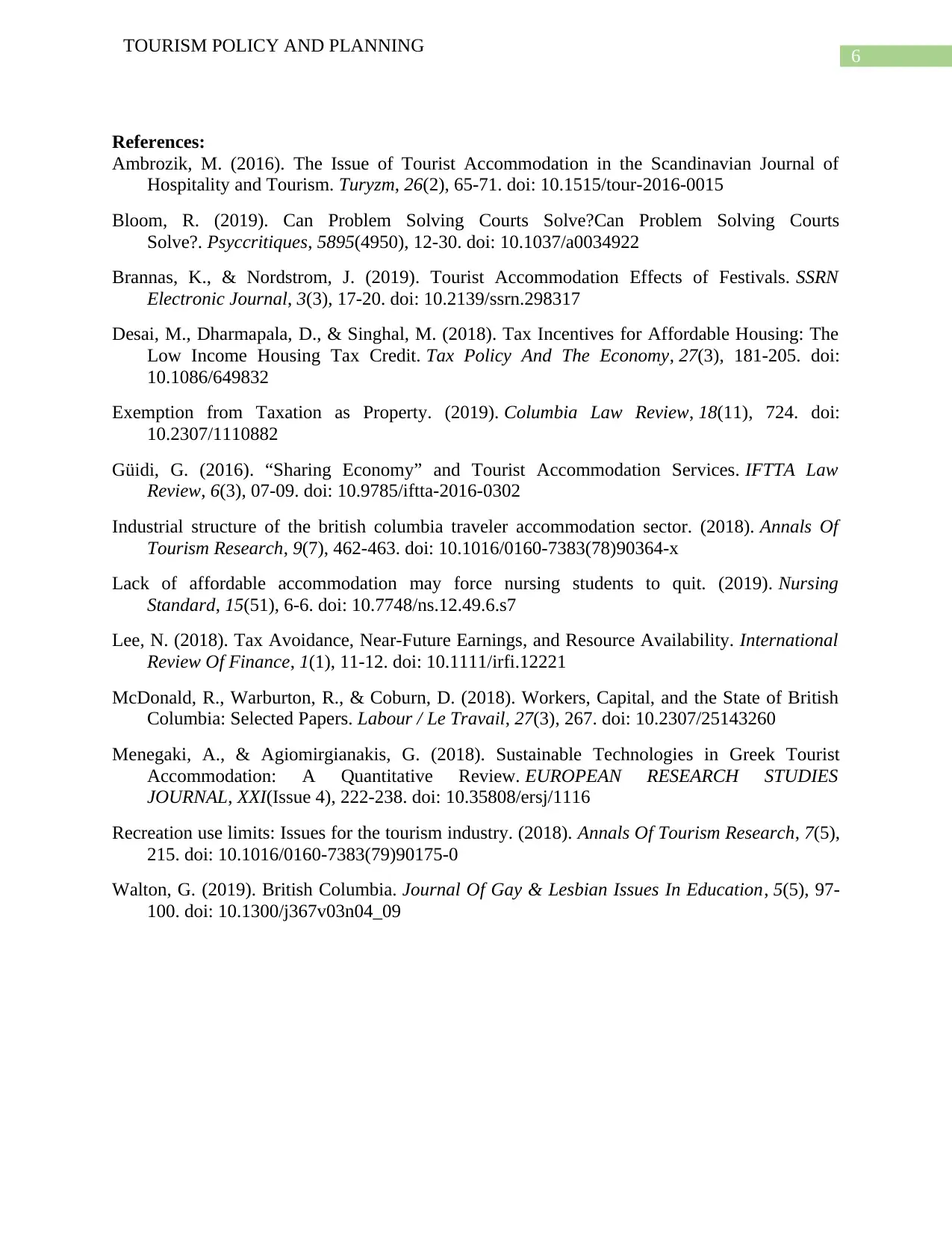
6
TOURISM POLICY AND PLANNING
References:
Ambrozik, M. (2016). The Issue of Tourist Accommodation in the Scandinavian Journal of
Hospitality and Tourism. Turyzm, 26(2), 65-71. doi: 10.1515/tour-2016-0015
Bloom, R. (2019). Can Problem Solving Courts Solve?Can Problem Solving Courts
Solve?. Psyccritiques, 5895(4950), 12-30. doi: 10.1037/a0034922
Brannas, K., & Nordstrom, J. (2019). Tourist Accommodation Effects of Festivals. SSRN
Electronic Journal, 3(3), 17-20. doi: 10.2139/ssrn.298317
Desai, M., Dharmapala, D., & Singhal, M. (2018). Tax Incentives for Affordable Housing: The
Low Income Housing Tax Credit. Tax Policy And The Economy, 27(3), 181-205. doi:
10.1086/649832
Exemption from Taxation as Property. (2019). Columbia Law Review, 18(11), 724. doi:
10.2307/1110882
Güidi, G. (2016). “Sharing Economy” and Tourist Accommodation Services. IFTTA Law
Review, 6(3), 07-09. doi: 10.9785/iftta-2016-0302
Industrial structure of the british columbia traveler accommodation sector. (2018). Annals Of
Tourism Research, 9(7), 462-463. doi: 10.1016/0160-7383(78)90364-x
Lack of affordable accommodation may force nursing students to quit. (2019). Nursing
Standard, 15(51), 6-6. doi: 10.7748/ns.12.49.6.s7
Lee, N. (2018). Tax Avoidance, Near-Future Earnings, and Resource Availability. International
Review Of Finance, 1(1), 11-12. doi: 10.1111/irfi.12221
McDonald, R., Warburton, R., & Coburn, D. (2018). Workers, Capital, and the State of British
Columbia: Selected Papers. Labour / Le Travail, 27(3), 267. doi: 10.2307/25143260
Menegaki, A., & Agiomirgianakis, G. (2018). Sustainable Technologies in Greek Tourist
Accommodation: A Quantitative Review. EUROPEAN RESEARCH STUDIES
JOURNAL, XXI(Issue 4), 222-238. doi: 10.35808/ersj/1116
Recreation use limits: Issues for the tourism industry. (2018). Annals Of Tourism Research, 7(5),
215. doi: 10.1016/0160-7383(79)90175-0
Walton, G. (2019). British Columbia. Journal Of Gay & Lesbian Issues In Education, 5(5), 97-
100. doi: 10.1300/j367v03n04_09
TOURISM POLICY AND PLANNING
References:
Ambrozik, M. (2016). The Issue of Tourist Accommodation in the Scandinavian Journal of
Hospitality and Tourism. Turyzm, 26(2), 65-71. doi: 10.1515/tour-2016-0015
Bloom, R. (2019). Can Problem Solving Courts Solve?Can Problem Solving Courts
Solve?. Psyccritiques, 5895(4950), 12-30. doi: 10.1037/a0034922
Brannas, K., & Nordstrom, J. (2019). Tourist Accommodation Effects of Festivals. SSRN
Electronic Journal, 3(3), 17-20. doi: 10.2139/ssrn.298317
Desai, M., Dharmapala, D., & Singhal, M. (2018). Tax Incentives for Affordable Housing: The
Low Income Housing Tax Credit. Tax Policy And The Economy, 27(3), 181-205. doi:
10.1086/649832
Exemption from Taxation as Property. (2019). Columbia Law Review, 18(11), 724. doi:
10.2307/1110882
Güidi, G. (2016). “Sharing Economy” and Tourist Accommodation Services. IFTTA Law
Review, 6(3), 07-09. doi: 10.9785/iftta-2016-0302
Industrial structure of the british columbia traveler accommodation sector. (2018). Annals Of
Tourism Research, 9(7), 462-463. doi: 10.1016/0160-7383(78)90364-x
Lack of affordable accommodation may force nursing students to quit. (2019). Nursing
Standard, 15(51), 6-6. doi: 10.7748/ns.12.49.6.s7
Lee, N. (2018). Tax Avoidance, Near-Future Earnings, and Resource Availability. International
Review Of Finance, 1(1), 11-12. doi: 10.1111/irfi.12221
McDonald, R., Warburton, R., & Coburn, D. (2018). Workers, Capital, and the State of British
Columbia: Selected Papers. Labour / Le Travail, 27(3), 267. doi: 10.2307/25143260
Menegaki, A., & Agiomirgianakis, G. (2018). Sustainable Technologies in Greek Tourist
Accommodation: A Quantitative Review. EUROPEAN RESEARCH STUDIES
JOURNAL, XXI(Issue 4), 222-238. doi: 10.35808/ersj/1116
Recreation use limits: Issues for the tourism industry. (2018). Annals Of Tourism Research, 7(5),
215. doi: 10.1016/0160-7383(79)90175-0
Walton, G. (2019). British Columbia. Journal Of Gay & Lesbian Issues In Education, 5(5), 97-
100. doi: 10.1300/j367v03n04_09
1 out of 7
Related Documents
Your All-in-One AI-Powered Toolkit for Academic Success.
+13062052269
info@desklib.com
Available 24*7 on WhatsApp / Email
![[object Object]](/_next/static/media/star-bottom.7253800d.svg)
Unlock your academic potential
Copyright © 2020–2026 A2Z Services. All Rights Reserved. Developed and managed by ZUCOL.





